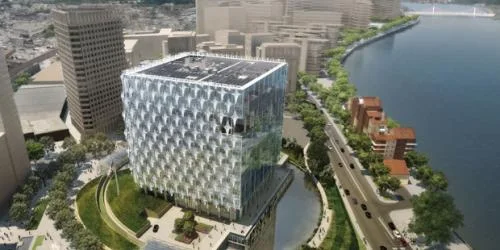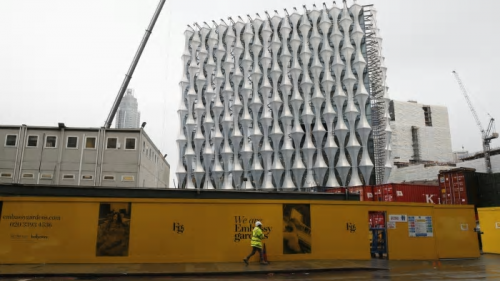If you google “London moats”, you’ll probably
alight on a link which will take you to “London’s Top 10 Moats: A
Spotter’s Guide”. We had no idea there were so many and could only think
of the “obvious” one surrounding the Tower of London, even if it’s
waterless these days. According to the guide, a defensive ditch has
surrounded the Tower since its origins in the eleventh century. The
moat, which contained water from the thirteenth century until the 1840s,
helps to protect the roughly cuboid “White Tower” keep, which gives the
Tower of London its name. Built by William the Conqueror in 1078, the
White Tower was resented as a symbol of oppression inflicted on London
by the new ruling elite.
Yesterday saw the press launch for the new US embassy in London which is situated on the south bank of the River Thames in the re-developed – albeit unattractively - part of the city near to Battersea Power Station. During the “celebrations”, architect James Timberlake, of Philadelphia-based firm Kieran Timberlake, described the new building as “the embodiment of peace and security”. The Daily Mail reported a spokesperson saying the glass structure “gives form to the core democratic values of transparency”. The lobby looks a bit “imperial” to us, but we’re probably mistaken.
Like us, the Financial Times sees paradoxes. Here is its take.
So if we summarise the excessive propaganda and shameless “spin”, the new embassy embodies. Peace;
The Washington Post got it right, saying “The U.S. Embassy here will exude openness while hiding all the clever ways it defends itself from attack…One assumes there is a CIA station, but that was not on the tour.”
Moving on the security features, here are some descriptions from a selection of media sources.
Yesterday saw the press launch for the new US embassy in London which is situated on the south bank of the River Thames in the re-developed – albeit unattractively - part of the city near to Battersea Power Station. During the “celebrations”, architect James Timberlake, of Philadelphia-based firm Kieran Timberlake, described the new building as “the embodiment of peace and security”. The Daily Mail reported a spokesperson saying the glass structure “gives form to the core democratic values of transparency”. The lobby looks a bit “imperial” to us, but we’re probably mistaken.
Like us, the Financial Times sees paradoxes. Here is its take.
The FT reports that the occupiers of the new building see it symbolising the “special relationship" between the two nations.It is central London’s first new moated building since the medieval era. The new US embassy in Nine Elms is a paradox, a heavily defended delicate glass box. Its architect calls it a “crystalline radiant beacon”; in fact, it resembles a corporate cube. It is also one of the world’s most expensive embassies, costing a cool $1bn.
It is not as sophisticated as its predecessor. Architect Eero Saarinen’s Mayfair building may not have been his finest work but it exuded a certain urbane, mid-century chic. It was huge yet it made efforts to blend in and completed one side of the 18th century square. By contrast, the new building stands alone, a 12-storey box in a field of ill-conceived and poorly planned towers. With two sides wrapped in a flimsy film of appliqué lampshades, it resembles a temporary Expo pavilion. Its glazing as metaphor for transparency and openness is unsettled by the inevitable heavy security apparatus.
As if that wasn’t enough, there is also good news for US taxpayers and anybody concerned with climate change. the $1 billion cost of the building was covered by two real estate sales, primarily the old embassy in Grosvenor Square, London. It’s also has “green credentials”, since its running is “carbon neutral” (actually it’s “nearly” self-sufficient in energy production) with the roof being clad in solar panels. Outside there is a lawn and inside there are internal gardens which “evoke different ecologies” of the US.US Ambassador Woody Johnson was keen, as were all the other speakers, to refer to the so-called “special relationship”. “This is not just a new office building,” he said “it’s a symbol of friendship between our two countries.”
So if we summarise the excessive propaganda and shameless “spin”, the new embassy embodies. Peace;
- Democratic values;
- Transparency;
- The “special relationship” with Britain;
- Low-cost; and
- Green credentials.
The Washington Post got it right, saying “The U.S. Embassy here will exude openness while hiding all the clever ways it defends itself from attack…One assumes there is a CIA station, but that was not on the tour.”
Moving on the security features, here are some descriptions from a selection of media sources.
The paradoxes in the new embassy building mirror the paradox in the way that the America sees itself, the leadership anyway, which is increasingly diverging from the way its seen by many in the rest of the world these days. One question which had puzzled us since the location of the new US embassy was announced several years ago, was didn’t they choose a more attractive part of London? Mayfair to Nine Elms was a strange move. Now we know the answer thanks to the Telegraph.The Daily Mail: Fortress America on the banks of the Thames, featuring a security moat”.
Financial Times: A section of its grounds facing the river are publicly accessible and a cascade billed as a “water feature” actually conceals a massive concrete base resistant to every form of attack.
The Telegraph: Buffered by an 8ft-deep, crescent-shaped moat and surrounded by armed guards, London’s new US embassy appears like Fort Knox amid a tangle of cranes and construction work.
Fox News: It is a high-tech high-security fortress in London. At $1 billion, the new U.S. embassy in the UK is the most expensive ever. The walls are blast-resistant. The glass is shatter-proof. It is diplomacy in the age of terror…Suspicious vehicles near the site triggered controlled detonations earlier this year.
Evening Standard: Ramparts: the embassy includes a multi-level garden to act as a security barrier.
Which is very sad given the principles that the nation claims to embody. The Telegraph again.The Americans chose that site as it was one of a few in central London that had enough space to contain all the security measures necessary, including being at least 100ft from all buildings.
SourceAt a press conference, the ambassador said he was not worried that anti-Trump demonstrations might dampen the optimistic mood the building represents. "The great thing about being in London, and the great thing about being in the US, is the ability to express your point of view,” he said. "That's an important part of who we are."



